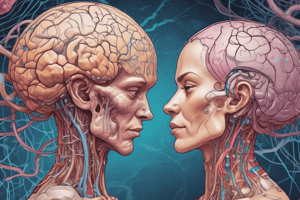Podcast
Questions and Answers
What is the primary function of ependymal cells in the central nervous system?
What is the primary function of ependymal cells in the central nervous system?
- Transmit electrical signals between neurons
- Protect neuron cell bodies
- Wrap around axons to form myelin sheaths
- Line brain ventricles and circulate cerebrospinal fluid (correct)
Which type of cell is responsible for producing myelin sheaths in the central nervous system?
Which type of cell is responsible for producing myelin sheaths in the central nervous system?
- Ependymal cells
- Schwann cells
- Oligodendrocytes (correct)
- Satellite cells
Which of the following neurons is primarily responsible for transmitting signals toward the central nervous system?
Which of the following neurons is primarily responsible for transmitting signals toward the central nervous system?
- Afferent neurons (correct)
- Efferent neurons
- Motor neurons
- Interneurons
What is the role of Schwann cells in the peripheral nervous system?
What is the role of Schwann cells in the peripheral nervous system?
Which of the following regions is NOT a major component of a typical neuron?
Which of the following regions is NOT a major component of a typical neuron?
What function do oligodendrocytes serve beyond creating myelin sheaths?
What function do oligodendrocytes serve beyond creating myelin sheaths?
What is the purpose of myelin sheaths around axons?
What is the purpose of myelin sheaths around axons?
Which glial cell type is responsible for protecting neuron cell bodies in the peripheral nervous system?
Which glial cell type is responsible for protecting neuron cell bodies in the peripheral nervous system?
What type of reflex is exemplified by the knee-jerk reaction?
What type of reflex is exemplified by the knee-jerk reaction?
Which cells are primarily responsible for supporting and insulating neurons in the CNS?
Which cells are primarily responsible for supporting and insulating neurons in the CNS?
What is the primary role of microglia in the brain?
What is the primary role of microglia in the brain?
What type of reflex primarily regulates smooth muscles and internal organ functions?
What type of reflex primarily regulates smooth muscles and internal organ functions?
Which structure is responsible for forming the blood-brain barrier?
Which structure is responsible for forming the blood-brain barrier?
Which of the following options correctly describes the composition of the myelin sheath?
Which of the following options correctly describes the composition of the myelin sheath?
During the activation of the somatic nervous system, which muscle type is primarily involved?
During the activation of the somatic nervous system, which muscle type is primarily involved?
What characteristic best describes efferent neurons in the nervous system?
What characteristic best describes efferent neurons in the nervous system?
Which of the following nerve fibers are responsible for carrying information to the central nervous system?
Which of the following nerve fibers are responsible for carrying information to the central nervous system?
What are the two subdivisions of the motor (efferent) division of the nervous system?
What are the two subdivisions of the motor (efferent) division of the nervous system?
Which type of nervous system structure is responsible for involuntary functions like heart rate and digestion?
Which type of nervous system structure is responsible for involuntary functions like heart rate and digestion?
In the context of neuron structure, which part of the neuron is primarily responsible for transmitting signals away from the cell body?
In the context of neuron structure, which part of the neuron is primarily responsible for transmitting signals away from the cell body?
Which cells are responsible for forming the myelin sheath around peripheral neurons?
Which cells are responsible for forming the myelin sheath around peripheral neurons?
Within the human nervous system, which division is primarily involved in voluntary movement?
Within the human nervous system, which division is primarily involved in voluntary movement?
Which of the following correctly describes the role of the central nervous system?
Which of the following correctly describes the role of the central nervous system?
Which part of the nervous system includes nerves outside of the brain and spinal cord?
Which part of the nervous system includes nerves outside of the brain and spinal cord?
Flashcards are hidden until you start studying
Study Notes
Support Cells of the Central Nervous System (CNS)
- Ependymal Cells: Line brain and spinal cord cavities, forming a membrane that circulates cerebrospinal fluid (CSF), maintaining CNS environment and providing protection.
- Oligodendrocytes: Wrap around CNS nerve fibers, producing myelin sheaths that increase electrical signal transmission speed and efficiency.
- Astrocytes: Star-shaped support cells that brace neurons, form the blood-brain barrier (BBB), and regulate the brain's chemical environment.
- Microglia: Spiderlike phagocytes that clean up cellular debris, dead neurons, and waste products in the brain, acting as its cleanup crew.
Support Cells of the Peripheral Nervous System (PNS)
- Satellite Cells: Protect neuron cell bodies in the PNS.
- Schwann Cells: Form myelin sheaths around PNS axons, facilitating faster signal transmission.
Neurons
- Definition: Specialized nerve cells responsible for transmitting messages.
- Major Regions: Composed of the cell body (nucleus and metabolic center) and processes (fibers extending from the cell body).
Structural Classification of the Nervous System
- Central Nervous System (CNS): Includes the brain and spinal cord.
- Peripheral Nervous System (PNS): Comprises nerves outside CNS, including spinal and cranial nerves.
Organization of the Nervous System
- Sensory (Afferent) Division: Carries information to the CNS.
- Motor (Efferent) Division: Transmits impulses away from the CNS, further divided into:
- Somatic Nervous System: Controls voluntary movements.
- Autonomic Nervous System: Regulates involuntary processes.
Reflexes and Regulation
- Patellar Reflex: A two-neuron reflex arc exemplifying a simple reflex pathway.
- Somatic Reflexes: Involve activation of skeletal muscles (e.g., pulling hand away from hot surface).
- Autonomic Reflexes: Regulate smooth muscles, heart function, blood pressure, glands, and digestive system activity.
Neuroglia
- Collective term for support cells in the CNS, providing insulation, protection, and support to neurons.
Studying That Suits You
Use AI to generate personalized quizzes and flashcards to suit your learning preferences.




